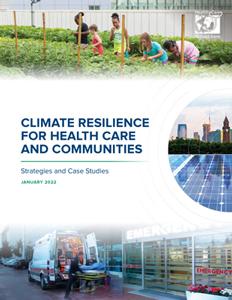Climate Resilience for Health Care and Communities: Strategies and Case Studies provides a strategic framework for building truly climate-resilient health systems and communities, and explores how health care institutions can leverage investments to support equitable decarbonization and build community resilience, health, and wealth. Through case studies, this paper outlines actions health systems can take to improve their ability to adapt and recover from climate-driven service impacts, strengthen long-term sustainability, and support health and equity in the communities they serve.
As anchor institutions, health systems have both a responsibility and an economic self-interest in making sure their communities are healthy, safe, and climate resilient. Health care institutions can leverage their social, political and economic influence to address social and environmental determinants of health and help communities improve their ability to adapt to and recover from climate impacts. It is essential to the long-term sustainability of health care and public health that health care institutions partner with the communities they serve to assess and address climate vulnerabilities.
A companion piece: For those ready to take action
Climate Resilience for Health Care and Communities: Strategies and Case Studies serves as a companion to a piece we authored in 2018, Safe haven in the storm: Protecting lives and margins with climate-smart health care. That paper makes the business case for health systems to invest in climate resilience, and provides a four-point action plan for health systems:
- Manage extreme weather risks
- Reduce emissions
- Invest in community resilience
- Lead on policy
Converging crises highlight inequities and urgency
The syndemic of coronavirus, racism, and climate change converged in 2020 and 2021, laying out the inequities and vulnerabilities of our society. All of our fundamental systems are impacted by these overlapping crises: our health, economy, food systems, housing, safety, preparedness, and democracy.
Like COVID-19, climate change does not impact all people equally. The same factors that created the economic and health inequities that have led to much higher death rates and serious illness from COVID-19 among people of color, the elderly, the chronically ill, and low-income communities are contributing to social disparities in the impacts of climate change.
Health care has been at the epicenter of these current disruptions. The pandemic and extreme weather events have tested the limits of health system preparedness and crisis management and posed a risk to the financial stability of many institutions. This moment has reinforced the deeply rooted connection between community health, equity, and resilience and a hospital’s ability to withstand disaster.
Climate Resilience for Health Care and Communities: Strategies and Case Studies provides a strategic framework for health care systems to improve the climate resilience of their facilities and the communities they serve, and provides real-world examples of health system’s taking meaningful action.
